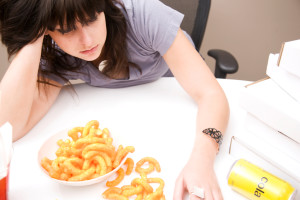by Linda K. Laffey, MFT
Have you ever sat and wondered at the plates, packages, or piles of food you just ate
… and still felt a hole inside?
 It feels like an emptiness that just won’t fill, no matter how much you eat and drink. No matter how long you drag out a meal, the momentary sense that you’re getting somewhere, getting something done, feeling better, or becoming a bit more full or happier quickly dissipates.
It feels like an emptiness that just won’t fill, no matter how much you eat and drink. No matter how long you drag out a meal, the momentary sense that you’re getting somewhere, getting something done, feeling better, or becoming a bit more full or happier quickly dissipates.
Really, when the food is gone, all you’re left with, every time, is a belly stretched to capacity, and the only thing filling the space you can’t feed is shame, boredom, sadness, loneliness or fill in the emotional blank.
What’s wrong here? Why can’t you fill this emotional hole as easily as you filled your stomach?
It’s likely because you’re choosing the wrong “food.”
You’ve been eating and overeating in hopes of filling in a missing part of yourself, some place that needs examination, understanding, and attention. The weight you may be carrying might actually be representative of an unaddressed emotional burden. Food helps you cope, but hunger or the lack of food isn’t the true problem. That’s why it doesn’t soothe you for long.
The hole inside can be filled, when you shed your shame about the food, and allow yourself to dig deeper.
So how do you do this? How can you become more in tune and aware of the unmet need that you’ve been trying to feed? How can you uncover what’s troubling you and ease your need to soothe, distract, or cope with food?
Look at what has happened to you. Consider your influences:
- Biological factors: Physically, you may have issues that require a medical doctor’s help. Perhaps biological abnormalities in your hormones, or genes, might be connected to your desire to eat compulsively. Talk with a doctor you trust; don’t let shame keep you from your best, and most informed view of your body, and its needs.
- Psychological factors: Mentally and emotionally, you may need a therapist’s guidance to determine why you make the choices you do. How are you? Really? If you resist the urge to eat, how uncomfortable do you feel? Trauma, depression, anxiety, and low self-esteem are often the driving forces behind compulsive eating.
- Cultural factors: The way you are impacted by your early attachments, relationships, media exposure, and community may have a significant impact on you. Social pressure to be thinner, more attractive, or more desirable, may be triggering compulsive eating. Criticism, or the sense that your body or weight is unacceptable to others, can make you particularly susceptible to compulsive eating.
Seek out someone to help you. Consider reaching out for therapeutic assistance.
By seeking out professional help, you can deal with the underlying issues connected to compulsive eating.
Working with a therapist, and possibly a doctor and/or nutritionist can help you get to your core issues the following ways:
- Therapy helps interrupt and alleviate body, weight, and food obsession.
- Therapy helps give you the tools to make informed, healthy choices, based on understanding.
- Therapy helps you build confidence and self-control, publicly and privately.
- Therapy actually helps you resolve underlying issues historically, relationally, and emotionally to reach the root of what is contributing to the disordered eating.
- Therapy can help you repair and solidify your healthiest sense of self, so that self-compassion, self-esteem, and self-respect help open avenues for filling empty places in your life.

